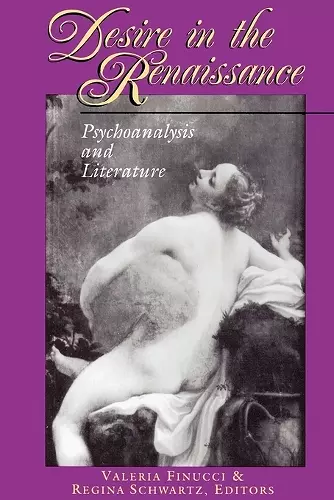Desire in the Renaissance
Psychoanalysis and Literature
Regina Schwartz editor Valeria Finucci editor
Format:Paperback
Publisher:Princeton University Press
Published:29th Nov '94
Currently unavailable, and unfortunately no date known when it will be back

The new historicism, which in recent years has become the predominate mode of reading the Renaissance, rarely manages to account for the 'literariness' of literary texts. I see [this book] as redressing the new historicism's sin of omission. -- Giuseppe F. Mazzotta, Yale University
Offers discussions of the ways the 'inner life' is depicted in the Renaissance and the ways it is shown to interact with the 'external' social and economic spheres. This volume features essays focusing on the fluidity of gender, the economics of sexual and sibling rivalry, the power of the visual, and the cultural echoes of the uncanny.Drawing on a variety of psychoanalytic approaches, ten critics engage in exciting discussions of the ways the "inner life" is depicted in the Renaissance and the ways it is shown to interact with the "external" social and economic spheres. Spurred by the rise of capitalism and the nuclear family, Renaissance anxieties over changes in identity emerged in the period's unconscious--or, as Freud would have it, in its literature. Hence, much of Renaissance literature represents themes that have been prominent in the discourse of psychoanalysis: mistaken identity, incest, voyeurism, mourning, and the uncanny. The essays in this volume range from Spenser and Milton to Machiavelli and Ariosto, and focus on the fluidity of gender, the economics of sexual and sibling rivalry, the power of the visual, and the cultural echoes of the uncanny. The discussion of each topic highlights language as the medium of desire, transgression, or oppression. The section "Faking It: Sex, Class, and Gender Mobility" contains essays by Marjorie Garber (Middleton), Natasha Korda (Castiglione), and Valeria Finucci (Ariosto). The contributors to "Ogling: The Circulation of Power" include Harry Berger (Spenser), Lynn Enterline (Petrarch), and Regina Schwartz (Milton). "Loving and Loathing: The Economics of Subjection" includes Juliana Schiesari (Machia-velli) and William Kerrigan (Shakespeare). "Dreaming On: Uncanny Encounters" contains essays by Elizabeth J. Bellamy (Tasso) and David Lee Miller (Jonson).
"Desire in the Renaissance is impressive in its range, and shows how comprehensive the use of psychoanalytic theory in literary criticism has become. At their best, the essays demonstrate the power of psychoanalysis to elucidate the convoluted workings of literary language, and argue for its peculiar compatibility with the dizzying gamesmanship of early modern texts."--Katy Emck, Times Literary Supplement
ISBN: 9780691001005
Dimensions: unknown
Weight: 397g
272 pages